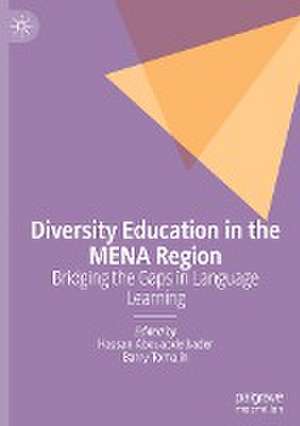Diversity Education in the MENA Region: Bridging the Gaps in Language Learning
Editat de Hassan Abouabdelkader, Barry Tomalinen Limba Engleză Hardback – 14 dec 2023
Preț: 897.65 lei
Preț vechi: 1094.69 lei
-18% Nou
Puncte Express: 1346
Preț estimativ în valută:
171.77€ • 177.20$ • 143.34£
171.77€ • 177.20$ • 143.34£
Carte tipărită la comandă
Livrare economică 26 martie-09 aprilie
Preluare comenzi: 021 569.72.76
Specificații
ISBN-13: 9783031426926
ISBN-10: 3031426924
Pagini: 375
Ilustrații: XXX, 375 p. 21 illus., 18 illus. in color.
Dimensiuni: 148 x 210 mm
Greutate: 0.64 kg
Ediția:1st ed. 2023
Editura: Springer Nature Switzerland
Colecția Palgrave Macmillan
Locul publicării:Cham, Switzerland
ISBN-10: 3031426924
Pagini: 375
Ilustrații: XXX, 375 p. 21 illus., 18 illus. in color.
Dimensiuni: 148 x 210 mm
Greutate: 0.64 kg
Ediția:1st ed. 2023
Editura: Springer Nature Switzerland
Colecția Palgrave Macmillan
Locul publicării:Cham, Switzerland
Cuprins
1. The Challenge of Diversity Education: Defending the Devil or Adjusting the Clock?.- Part I Diversity Management Education and Language Learning.- 2. Diversity in Tertiary Language Education.- 3. Representation, Engagement, and Expression in Moroccan Higher Education Curricula: Focus on Reading Comprehension.- 4. Encouraging Diversity and Student Engagement in the Classroom.- Part II The Impact of Diversity Education, Equity, and Inclusion on Language Learning.- 5. Towards the Construction of a Diversity Education Landscape in Moroccan Higher Education Language Curricula.- 6. Sustainable Policies and Strategies in the Mena Region for Teaching English as a Foreign Language.- 7. Diversity of ELT in Omani Higher Education.- Part III Language Education Curricula, Inclusion, and Social Mobility in MENA.- 8. Linguistic Diversity in Education: The Case of Israel.- 9. Students’ and Teachers’ Perceptions of Diversity Education inMoroccan Higher Education Language Curricula: A Case Study.- 10. How Culturally Diverse Is the Virtual Space? Towards Inclusive Pedagogy: A Case Study at the Arab Open University.- Part IV Diversity Education and Intercultural Communication Issues in Language Learning in the MENA Region.- 11. The Mediatization of Education: Classroom Mediation as an Agent of Change in Middle Eastern Higher Education Systems.- 12. When Inequalities Are Reversed: Algeria's Gender Inequity in Education.- Part V Sustainability: Student Potential and Communication Ability in the Balance.- 13. Diversity and Inclusivity in Tertiary Language Education—The Case of Turkey—Turkiye.- 14. Understanding and Maximizing Diversity Education in the MENA Region.- 15. Conclusion: The Way Forward.
Notă biografică
Hassan Abouabdelkader is Professor of Education at Moulay Ismail University, Meknes and SIST, British Education, Casablanca, Morocco. He is also a researcher and educational consultant whose professional experience in librarianship and language teaching, respectively at the British Council, Rabat, and Moulay Ismail University, earned him large insights in the field of Applied Linguistics. Abouabdelkader has also worked as a teacher trainer for twenty years at the Ecole Nationales Supérieure before joining the ENSAM, Moulay Ismail University, Meknès where he worked as Professor of English and coordinator of the Communication department. His academic works include his participation in several international conferences and seminars in the United States, Canada, and several European countries.
Barry Tomalin is Visiting Lecturer at Glasgow Caledonian University, London, UK. He is Director of the Business Cultural Trainer's Certificate at International House, London and Editor in Chief and Editorial Consultant of two international online academic journals, the ICC-Language Journal and Training, Language and Culture.
Barry Tomalin is Visiting Lecturer at Glasgow Caledonian University, London, UK. He is Director of the Business Cultural Trainer's Certificate at International House, London and Editor in Chief and Editorial Consultant of two international online academic journals, the ICC-Language Journal and Training, Language and Culture.
Textul de pe ultima copertă
This book outlines a landscape of diversity education in the MENA region and its repercussions on learners' abilities, outcomes, and prospects. It addresses the concerns of language educators, curriculum designers, language education researchers, students and trainers. Theoretically, the issues of diversity, inclusion and equity share common principles and insights; yet they are not conceived of in this book as interchangeable. These subtle distinctions, as delineated in this book, show that they are complementary and include the principles of quality education which leverage human rights, sustainability and promotion of the human capital. What makes this book distinctive is that it reconsiders the existing pedagogical trends in terms of the current social upheavals, and with reference to the principles of development and progress needed in twenty-first century education.
Caracteristici
Uncovers the state of diversity and inclusion in higher education in the MENA Region Explores the way the curricular orientations vary both interculturally and philosophically Addresses how the learning and teaching of languages poses additional demands on teachers and learners
